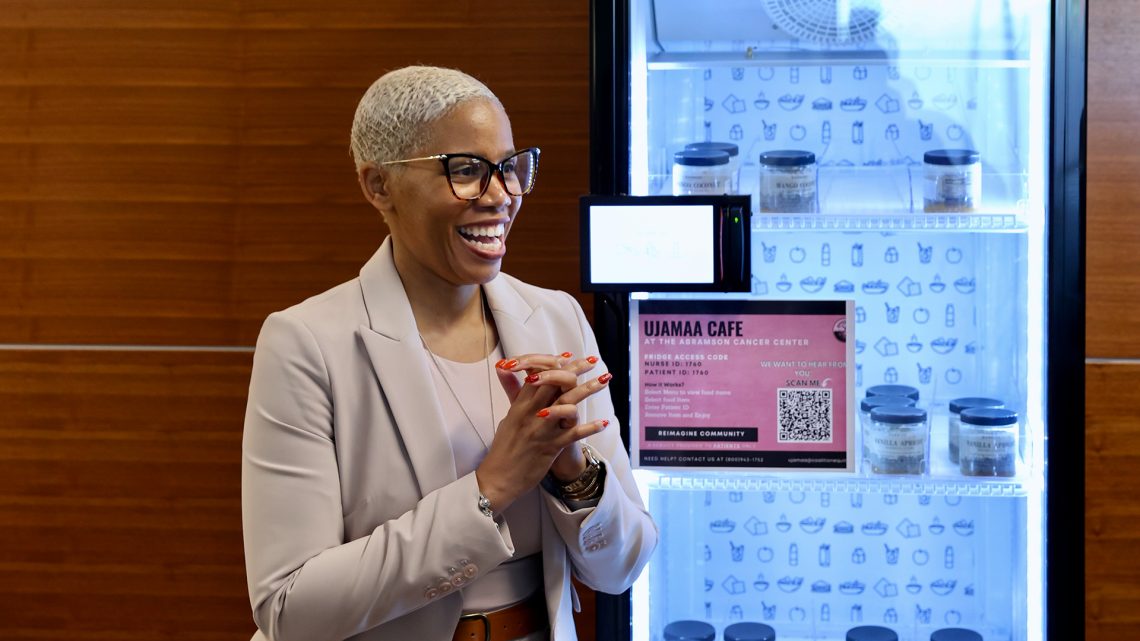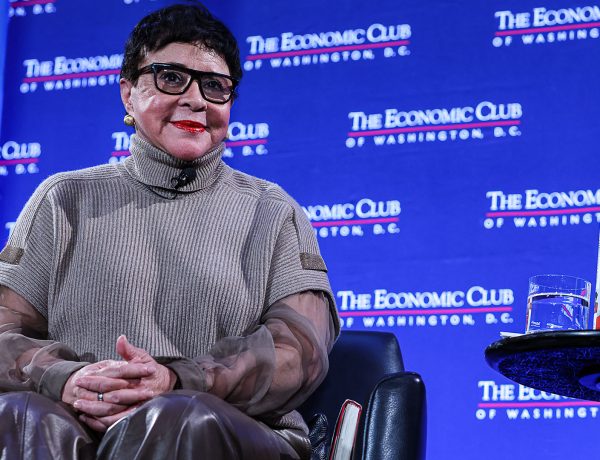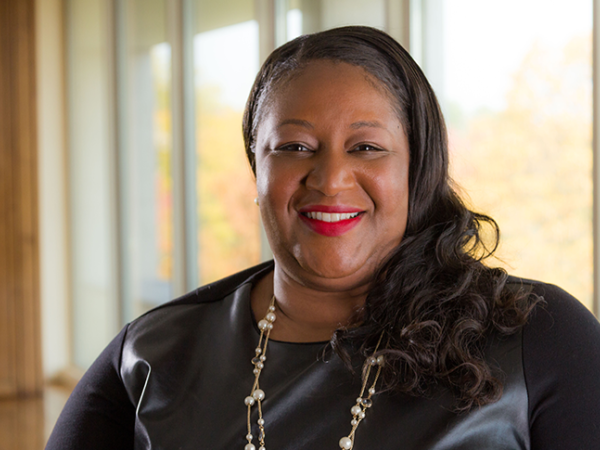After dedicating years to researching Black women’s health, Dr. Leeja Carter has developed a device to assist them.
As a professor and a scholar, Carter had a desire to do more work within the community beyond the standard work on publications and presentations. Even in her academic role at Long Island University in Brooklyn, NY, she said she felt like a spectator to the issues that were important to her. That all changed in 2020.
“My research and work were really social determinants of physical activity and its impact on Black women’s health,” Carter told AFROTECH™. “And being in academia for 15 years as a Black woman researching Black women’s health, while I definitely had spaces of comfort, care, and support, I would say there were greater experiences where I still definitely felt like an outsider and felt that it was still an uphill battle to gain support to do the work that was so close to my heart.”
She added, “When you’re in an academic space, what is currency is publications and presentations, and how many students want to take your classes to hear about the research. What is not currency is you being out there doing change-making in the community. And even though I had a great division chair who was actually on my board for my nonprofit, and he was so supportive of my work, the people above him would be like, ‘Doctor Carter, she’s publishing and all of that, but she spent a lot of her time out in the community, and we want her… more in the classroom.’ And so there’s a lot of dissonance as an academician.”
Coalition For Food And Health Equity
Carter would officially pivot career paths in 2020, leaving academic life in the wake of the COVID-19 pandemic. Carter recognized an increase in the number of people who were without food and jumpstarted the Coalition for Food and Health Equity (CFHE), which began as a grassroots activity. Its early days included aiding a local cafe in New Jersey that had fallen into debt and was on the brink of closing by creating a hunger task force and raising money through GoFundMe.
“We started the GoFundMe. We raised $30,000, and because some of my students were social workers, we created a whole back-end enrollment system and way to actually intake what people needed to eat,” Carter explained. “So, if somebody called in and said like, ‘Hey, I’m pre-diabetic,’ we got to keep your sugar low. It’s a whole system that we still use today. So that way, we would give it to the restaurant, and they would medically tailor those foods that we then had. Volunteer delivery people, myself included, would take it directly to people’s steps… So we started doing that, and it caught fire.”
From there, Carter received a call from the county’s director of health and human services to assist seniors, and she received $600,000 in funding to create the Hudson County Hunger Project. Through that work, she recognized how dire the need was to mobilize healthy food options, particularly within food deserts.
“They were asking for food and needing to enroll in our program because there weren’t healthy food options close to them — close meaning within a half-a-mile distance,” she said. “Also, many of the people that we delivered to were folks that were formerly incarcerated. They might be in hotels. They might not have a stove or a storage for produce. So, they really needed a pre-made food option that was healthy, or they were recently discharged from a hospital. Our program became lifesaving for these people.”
The Hudson County Hunger Project concluded in December 2020. However, it now exists within Carter’s nonprofit — which formed in 2021 — and rebranded as CFHE’s The Hunger Project. It works with individuals across the state. The Coalition for Food and Health Equity also houses the Eating Better Together program, dedicated to oral health, food security, and nutritional equity. Another key initiative is its rapid-response program, which has helped more than 2,000 individuals who are in an immediate hunger crisis. This program makes it possible for a meal to be dispatched within 60 minutes through food partners, such as Pita Square.
Ujamaa Cafe
The Coalition’s scope also includes leveraging technology through its smart refrigerator program Ujamaa Cafe, which provides healthy food items for free with the help of local food entrepreneurs and wholesalers. The Ujamaa Cafe is already being placed in schools and hospitals.
“That program is my baby. It’s very close to my heart because it does a few things,” Carter said. “One is we place the refrigerators in food apartheid and food desert communities where there’s less than half-a-mile access to fresh and healthy food options. The second thing is that we partner with local food entrepreneurs and wholesalers to be the ones that are providing the food. And that’s important because currently… the food system is dominated by a certain set of people who provide food into the charitable food market.”
She continued, “What we’re trying to do is say that, to really help address hunger and food security, we have to allow more people into this system. People like our local entrepreneurs, our local wholesalers, our local growers, they can all be part of the solution to help people eat well and to be less food insecure.”
With the Ujamaa Cafe, Carter aims to expose individuals to various nutritional options. The fridge offers a pool of 41 products, approved by an internal team, that include hibiscus teas; a variety of parfaits (banana, strawberry, mixed berry); health-conscious burritos (shrimp, carne asada, walnut chorizo, vegan); egg sandwiches; peanut butter and jelly sandwiches; overnight oats with vegan, lactose-free, and gluten-free options; Arabic salad; hummus with pita chips; and vegan cookies.
“My older sister said to me, ‘You just want people to be able to eat how you eat.’ And to me, that’s equity,” Carter expressed. “There is nothing in the fridge I would not eat. Everything in the fridge is delicious. It’s a balanced, health-conscious fridge. There’s nothing in the fridge that is super right-leaning healthy or super left-leaning… It also begins to prime people in that way to what health might look like. So it’s a lot of different entry points to healthy food, access to economics, and how technology can just be so helpful in all of this.”
The fridge’s technology also helps track user transactions and trends and captures data for restocking and reducing waste and spoilage. Currently, seven fridges have been placed in areas across New Jersey, and one at the Philadelphia, PA-based Abramson Cancer Center. Locations include the Hudson Pride Center, North Jersey Community Research Initiative, and the Saint Luke’s Food & Clothing Center. Participating schools with fridges include Marion P. Thomas Charter Schools and the Newark School of Data Science and Information Technology.
Carter has even added an educational element to the Ujamaa Cafe at the schools, launching the Sankofa Youth Incubator Program. It provides young food entrepreneurs with education, intelligence support, mentorship, and front-end product placement, according to information provided to AFROTECH™.
“For the kids that are interested, if they have a food product that they want to take from ideation, just a dream, basically, to actually bring it to market, they can enroll in our nine-month curriculum, which will literally take it from just an idea to an actual fully developed product that we are going to help them sell in a store, but also become part of our Ujamaa Cafe entrepreneur network and include them in our fridges so that way we can continue to expand the food system for us in our ecosystem,” Carter said.
The Newark School of Data Science and Information Technology also plans to launch a science, technology, engineering, and mathematics (STEM) program. Students will have a chance to learn about the back-end predictive forecasting and modeling that is used to restock the smart refrigerator.
“The reason why we’re doing that is part of sustainability for us is bringing the next generation of food scientists and food security activists into the fold. So, we got high school students. Let’s bring them into the fold and teach them this next generation of work,” Carter said.





